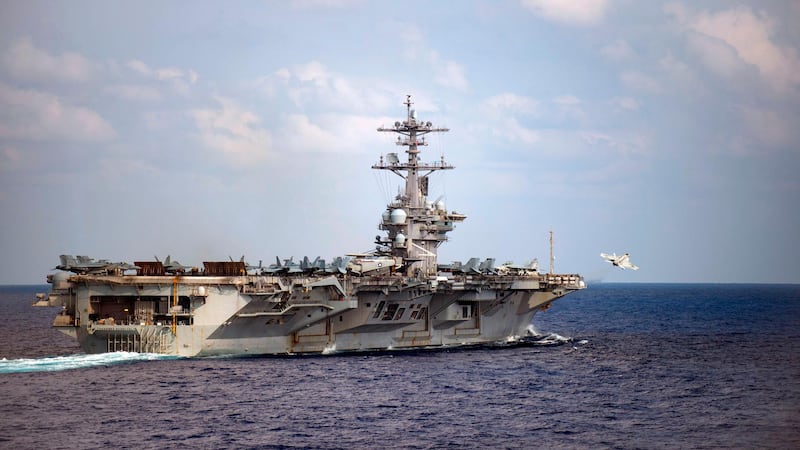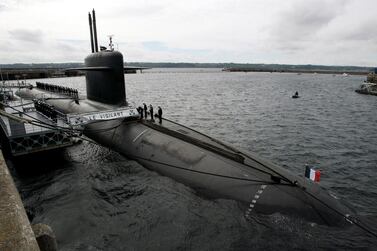There are few responsibilities as daunting and sacred as commanding a warship at sea. During my decade in the Royal Navy, I viewed at close quarters captains grappling with the loneliness of command and balancing the demands of readiness for war with the welfare of hundreds of sailors.
By all accounts, Captain Brett Crozier of the nuclear-powered Nimitz-class aircraft carrier USS Theodore Roosevelt – known as the Big Stick – was one of the finest of that special breed.
A former F-18 Tomcat pilot who flew combat missions over Iraq, he suddenly found himself facing a new enemy: the coronavirus pandemic that had infected dozens of his 4,800-strong crew as it spread rapidly through the close confines of the vessel.
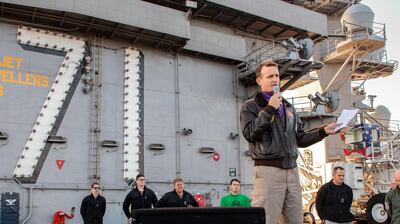
Dismayed by inaction from his superiors ashore, Capt Crozier composed a four-page letter laying out exactly how dire the situation was and requesting urgent assistance.
“This will require a political solution but it is the right thing to do,” he wrote. “We are not at war. Sailors do not need to die. If we do not act now, we are failing to properly take care of our most trusted asset – our sailors.”
Social distancing was impossible, he pointed out, arguing that the ship’s company should be reduced to a skeleton crew of 10 per cent: “Due to a warship’s inherent limitations of space, we are not doing this [social distancing]. The spread of the disease is ongoing and accelerating.”
The letter had an almost immediate effect. Leaked to the San Francisco Chronicle, it prompted the US Navy brass to move with fresh urgency. Within days, more than 1,000 of the crew were ashore in Guam.
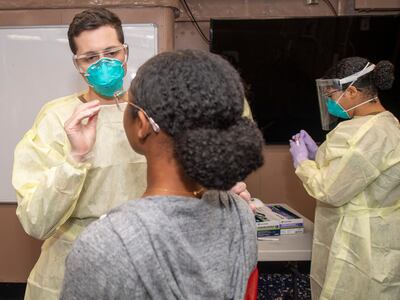
Capt Crozier's reward? He was ignominiously removed from command by Acting Navy Secretary Thomas Modly, who overruled the US Navy's top admiral. Not only had the USS Theodore Roosevelt lost its leader at a time of crisis, the decision apparently ended the illustrious career of an officer destined to command a fleet.
In another cruel twist, it then emerged that Capt Crozier, 50, had himself contracted coronavirus and was in isolation. By this week, 589 of the crew had tested positive for the virus and one sailor had died.
The aircraft carrier’s crew had let it be known just where they stood on the matter. Crowded onto the hangar deck, they chanted "Captain Crozier! Captain Crozier!" as their former commander descended the gangway.
"And that's how you send off one of the greatest captains you've ever had," a sailor narrated as he videoed the poignant send-off. "A man for the people."
US Navy Captain Brett Cozier gets a big send off from his crew: “Captain Crozier!”
— Negar Mortazavi (@NegarMortazavi) April 3, 2020
The commander of the USS Roosevelt aircraft carrier was fired for sending a letter pleading with leadership to protect sailors from #coronavirus. pic.twitter.com/NVLHYCEwxA
Mr Modly let it be known to colleagues that behind his motivation was the fact that “Trump wants him fired". Capt Crozier, it seems, had fallen victim to President Donald Trump’s desire to play down fears of the spread of Covid-19.
Mr Modly was not yet done. Flying from Washington just to visit the USS Theodore Roosevelt, he took to the same public-address system that Capt Crozier had used to update the crew on the battle against the coronavirus.
The ousted and infected captain, Mr Modly said, had either deliberately leaked the letter or was “too naive or too stupid to be a commanding officer of a ship like this". He was guilty of “betrayal” by trying to turn himself into a “martyr” through his actions.
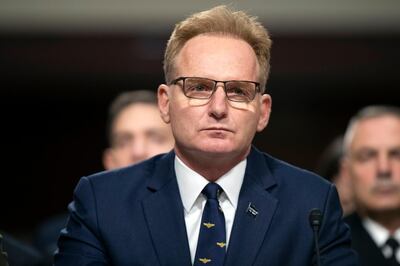
In what degenerated into a profane diatribe, Mr Modly launched a partisan attack on Joe Biden – the former vice president and Democratic Party 2020 presidential candidate. He suggested, with Trumpian hyperbole, that leaks to the media could destroy the Navy, adding: “Not long after that, we would no longer have a country.”
Mr Modly spent a few years in the Navy, flying Huey helicopters and teaching political science, before embarking on a career in business. He never commanded a ship and apparently knows little of the profound bond between a captain and crew.
As I was preparing to join the Royal Navy, I remember footage of the Falklands War of 1982 and Commander Alan West – later to become First Sea Lord, or head of the UK's Royal Navy – fighting back tears as he spoke of his sunken frigate HMS Ardent: "Every captain always says his men are the best. I know mine were."
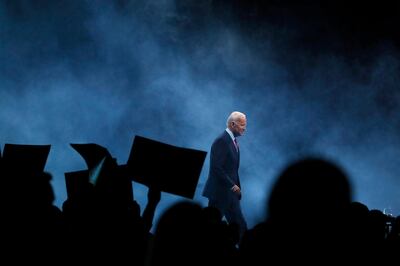
Two decades later, I interviewed survivors of the USS Indianapolis about their commanding officer, Captain Charles McVay. Still haunted by the loss of 879 of his 1,195-strong crew, he killed himself in 1968 at the age of 70.
What the likes of captains West, McVay and Crozier have grasped is that the fighting strength of a ship lies in the spirit of its crew. In the Royal Navy, it was drummed into us that it was not a ship’s weapons systems but the individual sailor that was “the greatest single factor” in war. Neglect that and you could, quite literally, be sunk.
By contrast, Mr Trump, who avoided Vietnam service due to a diagnosis of bone spurs, is dazzled by military hardware and seduced by Hollywood-style machismo.
Mr Modly's actions were too much even for Mr Trump, who backtracked: "I'm not looking to destroy a person's life, who's had an otherwise stellar career." Undercut by the president to whom he had pandered, the hapless Navy chief resigned.
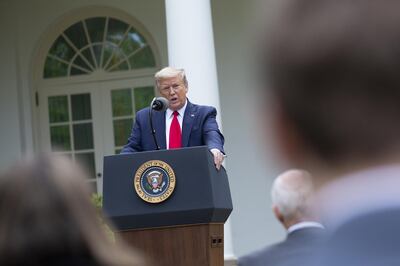
That the US Navy is grappling with the coronavirus outbreak is evident from this episode. The plight of the USS Roosevelt, for instance, could affect American containment of Iran, with the carrier USS Harry Truman having just been withdrawn from the Middle East.
In the long term, however, tackling the pandemic and stamping it out is paramount for military readiness – and that requires transparency. By raising the alarm, Capt Crozier helped deal with coronavirus on his ship before it killed. That eclipses the signal of short-term weakness sent to America’s adversaries that so angered the Trump administration.
It would therefore be an act of uncharacteristic grace for Mr Trump to reinstate Capt Crozier. Imagine the scenes – and symbolism – in the carrier's home port of San Diego if, weeks from now, the USS Theodore Roosevelt, its crew safe, back at full strength, and virus free, returned with Capt Crozier on its bridge.
Toby Harnden is a journalist, editor and author based in Washington DC
